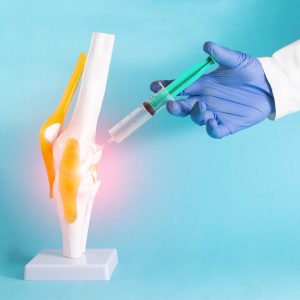Corticosteroids for Rheumatoid Arthritis

Rheumatoid arthritis (RA) is a painful autoimmune and inflammatory disease affecting millions of Americans. If you suffer from RA, you may have heard that corticosteroids could be an option for treatment. But what are corticosteroids, and how are they used to treat RA? Our orthopedic specialists have the answers.
Read on to learn more about corticosteroids and how they can help you manage symptoms of rheumatoid arthritis.
What are corticosteroids?
Corticosteroids are a group of drugs that are used to reduce inflammation. They have many different applications and can treat a variety of conditions, including asthma, arthritis, skin conditions, allergies, and other serious illnesses.
Why are corticosteroids used to treat RA?
RA is a chronic, meaning long-lasting, disorder where an overactive immune system attacks healthy tissue and causes the lining of the joints to swell. It’s most common in the hands, wrists, and knees. This chronic inflammation can result in joint tissue damage, deformity, and pain if left untreated.
Corticosteroids suppress the immune system’s response, reducing inflammation throughout the joints to alleviate pain and stiffness—two common symptoms of RA.
Types of Corticosteroids
There are three main types of corticosteroids used to treat rheumatoid arthritis:
Cortisone
Cortisone quickly reduces inflammation in the affected area and can be administered orally or with an injection in the affected joints. Cortisone is most frequently used as an initial treatment for mild to moderate symptoms, but it also has long-term applications, especially when other medications are unsuccessful.
Hydrocortisone
Hydrocortisone is similar to cortisone in that it acts quickly to reduce inflammation, but its effects last longer than cortisone alone. Hydrocortisone is typically most effective when injected—treating pain and stiffness more quickly than other oral treatment options. While you can take hydrocortisone orally, the dosage is usually much lower than injected doses, making it less effective.
Unlike cortisone, hydrocortisone can also be prescribed as a topical treatment or cream, which can be particularly helpful for those experiencing dermatitis (inflammation of the skin) or psoriasis.
Prednisone
Prednisone is a longer-lasting type of corticosteroid that provides relief from inflammation for an extended period of time. It can be prescribed orally as a pill or injected directly into the joint. When prescribed to treat RA, it is usually taken in pill form once daily or as directed by your doctor. Your dosage depends on your condition and response to treatment, so it’s important to follow your doctor’s instructions carefully.
Side Effects of Corticosteroids
While there are many benefits to taking corticosteroids to manage rheumatoid arthritis, some side effects are associated with long-term use. Common side effects of corticosteroids include:
- Increased risk for infection
- Weight gain
- Bone loss
- Increased blood pressure
- Mood swings
At Orlin & Cohen, our specialists can help you find a treatment option that improves your quality of life with minimal side effects. In addition to considering corticosteroid treatment options, your specialist may prescribe other pain management techniques or physical therapy, which can increase joint strength and mobility.
Orthopedic Specialists for Rheumatoid Arthritis at OC
The orthopedic specialists at Orlin & Cohen help patients just like you manage their rheumatoid arthritis. Your doctor works closely with our in-house diagnostic team to carefully evaluate your condition and develop a customized treatment plan.
Looking to find the best treatment for your rheumatoid arthritis? We’ve got specialists for that—and same-day appointments. Request yours now.



